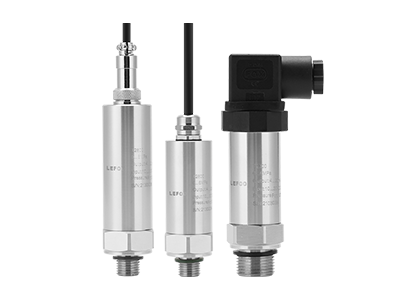Передатчик
Temperature pressure transducers are compound measuring tools designed to save space. In the many common industrial instruments where space is very premium, but still need measuring data both temperature and pressure; Having one device which can measure two variables is a better use of space than using two separate devices. Like any physical measurement system.
In Lefoo, one of the top pressure transmitter suppliers, Dual temperature pressure sensors are also suitable for the measurement of gases and liquids in the following industries;
Automotive
Industrial Hydraulics
Refrigeration
Offroad
Construction
Agriculture
Features of our Dual Pressure and Temperature Sensors
Lightweight stainless steel construction
Long life
High performance
High strength
Excellent reliability
Many of our dual pressure and temperature sensors are backed by a one-year warranty.
The temperature has a main effect on the functional lifetime of most electronic components, and this is especially real for pressure sensors. Hence, pressure sensor specifications usually include minimum and maximum temperature for ambient, compensated, storage, and medium temperatures. Exceeding these ranges can generate serious faults in the pressure measurement, or in extreme cases, lead to irreparable breakdown of the whole instrument.
The ambient temperature refers to the temperature range the pressure sensor resting to when in operation. For insistence, -20 to +80 ℃ is a typical ambient temperature range for standard pressure sensors. The output signal may show an extreme drift when not in the ambient temperature range. Exposure to extreme unbearable temperatures can lead to permanent damage on the whole operating instruments. If the sensor housing is made of metal and is measuring hot medium, the heat will be conducted by the process connection into the whole sensor. In this situation, The real operation temperature should at least minus 20℃ as it will get heat from the process medium. Another factor to consider is the cable. The rubber covering of cable become brittle in extreme cold environment.
Electronic circuits are typically less susceptible to damage from extreme temperatures when in stocking. The rated storage temperature specification may actually be less than the operating temperature range if the manufacturer includes the transducer packaging and tests to simulate transport. For example, foam packaging may deteriorate above 100 ℃ (212℉).
The medium temperature range is another important specification to consider when selecting a pressure transducer. The medium temperature directly impacts the overall performance and accuracy of the pressure sensor readings. Care must be taken to select a transducer with a medium temperature range that is greater than the expected minimum and maximum medium temperatures. Exceeding the medium temperature specifications can lead to significant errors or total damage of the instrument. A typical medium temperature range specification is -20~ +100℃. The compensated temperature range may be limited to -0 to +80oC, where the temperature error will be no greater than, say 0.2% of span for every 10 ℃ change within this range. The temperature error outside the compensated range will be significantly greater. As a rule of thumb, the temperature error outside the compensated range (but still below the maximum medium temperature) may be up to three times the compensated range error, so in this example, it would be approximately 0.6% of span per 10℃. This is the temperature the transmitter is exposed to during the calibration procedure during the manufacturing process, and is used as the starting point for calculating the error within the “compensated pressure range” described above. For example, a pressure transducer is calibrated at a standard temperature of 15-25℃. If the transducer is operated within this range, no additional temperature error is introduced. If the application is known to be at a constant temperature of 80℃, the transducer can be factory calibrated at this higher temperature. However, some special tailored transducers are available with significantly higher medium temperature specifications, and there are a number of options available for dealing with extreme medium temperatures.
pressure and temperature sensors are used for the measurement of gases and liquids in the following industries such as automotive, hydraulics instruments, and Construction, Temperature Pressure Sensors is integral to air conditioning, refrigeration, agricultural applications.
A Temperature based flow measurement system can be made from one or more temperature sensors. One easy means is to have one resistor surrounded by two temperature sensors placed symmetrically at the inlet and outlet side of the resistor. When the resistor is heated by passing a current, a state temperature curve is build up around the resistor. The two temperature sensors read the same temperature when the gas (media) is not moving. Since the temperature difference is proportional to the flow rate (linear at low flow rate and non-linear at high flow rate), we can determine the flow rate by measuring the temperature difference of the two temperature sensors. But in this case, The measuring scale is too long and not accurate enough. A single extra pressure sensor is needed for the measurement of the precise pressure value for many equipments.
Pressure sensors are subject to errors caused by temperature variations,as accuracy will change significantly due to small changes in temperature. In applications with wide temperature variations such as down-hole drilling, automobile manifold pressure monitoring, or autoclaves, If accuracy is an important parameter for the applications, then temperature errors assume larger importance.
In some general pressure sensors, a temperature-compensation circuit is mounted inside the body of the sensor to optimize the accuracy. Otherwise, If the sensor is subjected to a heat shock, either via the pressure medium or from the surrounding environment, large errors are possible that can exceed the specification. However, this effect does depend on the sensor’s construction, the technology used, and the purpose for which the sensor has been designed.
22 Oct 2023
Шаг в будущее: эволюция перистальтических насосов с шаговым двигателем14 Oct 2023
Инновационная обработка жидкостей: путь перистальтического насоса шагового двигателя к точности06 Oct 2023
Точность и контроль жидкости: обнародовать мощность перистальтического насоса шагового двигателя24 Sep 2023
Использование инноваций: будущее очистки воды с помощью насосов для очистки водыЗапрос на продукт
 English
English  français
français  Deutsch
Deutsch  Español
Español  italiano
italiano  русский
русский  português
português  العربية
العربية  Türkçe
Türkçe  Zulu
Zulu 
